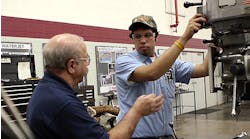June is a peculiar season. It’s a time for endings and beginnings: graduations, weddings, etc. This June we find ourselves in between a recession that’s past and a recovery that’s not full-force. We live in a world of tensions, both explicit and implicit. We’re on the cusp of an apparently bitter political season.
If I weren’t writing this column I could be at my college reunion, jogging my memories of onetime acquaintances and putting the best spin on my life’s accomplishments.
The choice between writing and reminiscing is not quite as clear as that: I would have written a commentary for this page in any case and I had no plans to attend the reunion. But, in my mind, these choices are connected. They both involve a sort of personal reflection.
Reunions are great fun for some people. Reminiscence, and the reveries that go along with it, allows them to recover various things they might have thought they’d lost. Perhaps they once again feel the sense unlimited opportunity that twenty-somethings have, or maybe they recover some of the idealism we attribute to bright young people.
That sort of reflection holds no appeal for me. I find it impossible to learn anything by reliving my own past. I know what went right and wrong, but rerunning it too quickly becomes self-involvement. It doesn’t move me forward.
On the other hand, there is much in the past that is instructive if we are clear-headed enough to see its meaning. As I write, there is a celebration taking place for the U.S.A.’s new monument to World War II. Soon we’ll mark the 60th anniversary of D-Day, the Battle of Normandy. This is our collective past, the events that changed utterly the world we inhabit. Honoring the achievements and sacrifice of our parents and grandparents reminds us of our core beliefs and identifies our proper goals. It’s not only a worthy reminiscence, to my mind it is an imperative one.
I draw this distinction between personal and collective reflection because it’s so easy to misread our own experience and become self-absorbed. Dwelling on our own past distorts the view of what we are today. Honoring the great people and events that precede us reminds us of what we hope to become.
When I write a column I assume readers want my insights. Writing well is not easy, because it demands honesty and revelation, but too much of either is not interesting to anyone. If I write it well it’s because I make points that resonate with my readers. They may credit me for my writing skill, but the truth is that my effectiveness is tied to my ability to strike a chord with something the reader already knows, or believes, or feels. It’s a shared effort.
This has been long wind-up for my pitch, but here it is: Don’t look for insights in yourself, or in others. Rather, refresh your memories of people you have admired: Parents, teachers, colleagues, or even public figures - with a just a bit of humility each one of us will recognize we have had several great influences. Recall the advice, traits, or habits you found so admirable. There is a shared understanding with that person that will improve your outlook, or reconfirm your beliefs.
You may think this whole column has been an ego-driven effort but I recommend this approach to you for addressing almost any dilemma.
The metalcasting industry has pressing challenges, and it has choices. It’s had many of the same problems for a long time. And still, there are numerous examples of leadership, creativity, and success to illuminate the way forward. Their influence, and your determination, will accomplish more than you may imagine.
America, too, is beset with serious problems, and we have choices to make. And just as we have had in past generations there are people working and sacrificing to help us overcome them. Knowing this, focusing not on our own problems but on our common goals, we’ll survive and thrive.









